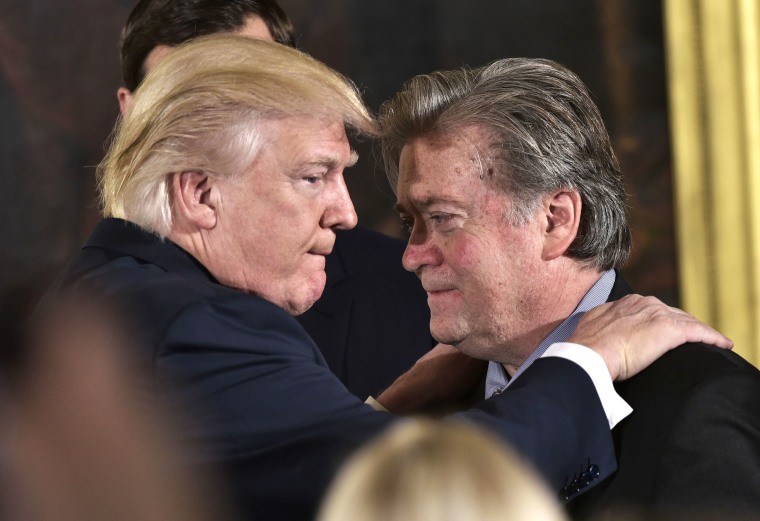WASHINGTON — Steve Bannon’s exit from the White House drew an immediate backlash from his allies in the party’s populist wing, who fear their agenda is becoming sidelined within the Trump administration.
“I don’t have any longer the expectations that Trump even can keep the rest of his promises," Rep. Steve King, R-Iowa, told NBC News on Friday after the announcement that the chief strategist would be leaving the administration.
The uproar threatens to divide Trump’s supporters during the most difficult stretch of his presidency yet and before a critical legislative push next month in which Congress must raise the debt ceiling, pass a budget, and make headway on tax reform.
Trump has faced withering criticism in recent days, including from members of his own party, over his response to the violence at last weekend's white nationalist demonstrations in Charlottesville, Virginia, and his defense of "very fine people" who marched with neo-Nazis there.
Trump thanked Bannon early Saturday in a tweet, saying: "He came to the campaign during my run against Crooked Hillary Clinton - it was great!"
King, whose hardline immigration stance made him a popular figure at Breitbart News, which Bannon ran before joining Trump's campaign, said the White House was being taken over by “northeasterners” instead of ideological conservatives, which "really hurts the long-term strategy of the Trump administration.”
Breitbart announced late Friday afternoon that Bannon had rejoined the news site as executive chairman.
In an MSNBC appearance on Friday, Pollak said Trump had so far satisfied his base’s concerns, but warned "if he veers away, if he pulls an Arnold Schwarzenegger and tries to reinvent himself as liberal, he will see that support erode very, very quickly."
While Breitbart was a critical early supporter of the president’s political rise, running interviews and favorable articles even before he announced his candidacy, their backing has not been absolute and their coverage has taken a special interest in Trump’s staffing decisions.
When Trump feuded with Attorney General Jeff Sessions, a popular figure among immigration restrictionists, the site pushed back with stories declaring that he “embodies the movement” Trump led and that his exit would “endanger the administration.”
More recently, Breitbart portrayed Bannon’s shaky status as part of a war for control of the White House between “economic nationalists,” the web site's favored side, and “globalists” like chief economic adviser Gary Cohn, National Security Adviser H.R. McMaster and Deputy National Security Adviser Dina Powell, all of whom featured prominently in the site's coverage.
Breitbart White House reporter Charlie Spiering’s reporting straightforwardly referred to the trio as “Bannon’s enemies in the White House” and the coverage has portrayed Cohn as too close to the financial world (he’s a former Goldman Sachs executive) and McMaster as overly hawkish on Afghanistan and weak on Islamic terror groups.
Trump weighed in on both McMaster and Bannon during the conflict, saying that McMaster was “a good man, very pro-Israel” in a statement earlier this month and telling reporters on Tuesday that Bannon was “a good man” and “not a racist” while hinting at his possible departure.
The anti-McMaster chatter grew loud enough to draw in figures like Sen. John McCain, R-Ariz., who decried a “disgraceful” campaign against him by the “alt right” in a statement this week. "Such smear tactics should not be tolerated and deserve an emphatic response," he said.
The Wall Street Journal’s editorial page also backed McMaster, drawing corresponding coverage in Breitbart with headlines like “Murdoch’s Wall Street Journal Tries to Take Over Trump White House for McMaster, Globalists.”
The tensions only escalated when Bannon called a reporter at the liberal publication The American Prospect and undercut the administration’s tough talk on North Korea’s nuclear program, saying “there’s no military solution” with acceptable losses and that “they got us.”
On the the other end of the political spectrum, Bannon’s ouster could be a small step toward easing tensions with elected Republicans upset over Trump’s Charlottesville response and who had previously expressed concerns about Bannon’s role.
Bannon, who once called Breitbart "the platform for the alt-right," had long been decried by anti-hate groups over his site's coverage, which included a tag for stories on "black crime" and ran op-ed articles by far right European politicians. In the days leading up to his exit, Reps. Pete King, R-N.Y., and Ileana Ros-Lehtinen, R-Fla., had both explicitly called for his firing.
“Those who relish culture wars & celebrate political polarization have no place leading a country in profound need of healing & unity,” Congressman Carlos Curbelo, R-Fla., tweeted in response to the news.
CORRECTION (Aug. 18, 6:31 p.m.): A previous version of this article misstated the title of Joel Pollack at Breitbart News. He is senior editor-at-large, not editor-in-chief.

